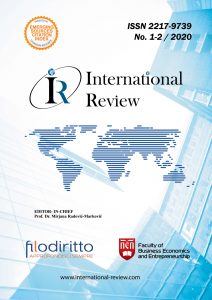Digital economy features in the field of state electronic services in the Russian Federation
Digital economy features in the field of state electronic services in the Russian Federation
Author(s): Vyacheslav Vasiliev Pavlovich, Valentina Dzobelova Batrazovna, Deschi Musostova Shamsudinova, Anna Zemtsova Viktorovna, Natiya Shitukhina SemenovaSubject(s): Economy, National Economy, Supranational / Global Economy, Socio-Economic Research
Published by: Visoka škola za poslovnu ekonomiju i preduzetništvo
Keywords: world economy; globalization; digital economy; state electronic services; information society
Summary/Abstract: The sharp increase in information and communication technologies, and, above all, the Internet, is a characteristic feature of globalization; it determines the progress of the world community to a new type of economy, which is increasingly called the digital (information) economy. The common features of the digital economy include a shift in most of the social, including economic, interaction into electronic space; promotion of distance work statuses and information transfer types; replacing people with robots in labor-intensive and hazardous industries; using electronic money, etc. In today's realities, information itself, undoubtedly, serves as a key strategic resource, the extent of which involvement can be compared with the use of traditional resources. As a result, access to information bases can be considered as an important factor in social, economic and even political development. In the conditions of constant transformation and increasing competition, we have to constantly look for new ideas and forms of organization of the economy and society in order to ensure sustainable development and effective functioning with a radical change in communication forms. It should also be noted that in the last decade there has been a significant modernization of previous ideas, attitudes, stereotypes and models of interaction between government structures, business structures, and civil society. Experts note the activation of the state in establishing economic relations and interaction between all interested participants by structuring the system of socio-economic relations and giving this system integrity and vitality. Among the priority areas of informatization processes there is the building of a system of electronic public services, through which the state provides a range of information services (for private applications, during state (municipal) procurements, etc.). Another independent and no less important problem is the need to study various aspects of standardization in the field of the digital economy in the Russian Federation. This is due to the peculiarities of the development of economic and technological components in the digital economy in Russia. Indeed, as many experts note, the fruitful theoretical development and the rich practice of standardizing complex socio-ecological-economic systems should allow us to develop a flexible regulatory mechanism by which we can provide the necessary balance between imperative state regulation and many dispositive contractual relations of participants in the digital transformation of the economy. And today it must be noted that only 29 standards of the more than 5300 national standardization system documents (GOST, GOST R) meet the requirements of the digital economy. The relevance of this paper is associated with the fact that the development of standardization of information and communication technologies (ICT) bears an enormous potential, which requires a scientific understanding of the prospects and consequences in socio-economic life.
Journal: International Review
- Issue Year: 2020
- Issue No: 1-2
- Page Range: 11-17
- Page Count: 7
- Language: English

